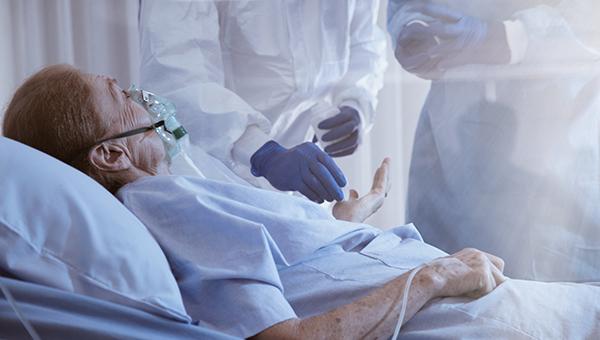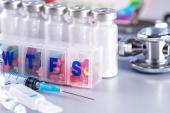REMAP-CAP: Mixed Results for Antiplatelets in Critical COVID-19
Adding aspirin or a P2Y12 inhibitor seemed not to help in the acute phase, although there were signals of benefit later on.

It’s unlikely that adding an antiplatelet agent to anticoagulation will increase the number of organ support-free days in critically ill patients with COVID-19, although it’s possible that survival in the first 90 days can be improved, according to the results of the REMAP-CAP trial.
The median number of days alive and free of ICU-based respiratory or cardiovascular support within the first 21 days—the primary outcome—was 7, both in patients who received aspirin or a P2Y12 inhibitor and in those who received anticoagulation alone (adjusted OR 1.02; 95% credible interval 0.86-1.23). There was a 95.7% probability of futility, Charlotte Bradbury, MD, PhD (University of Bristol, England), reported Tuesday at the International Symposium on Intensive Care and Emergency Medicine in Brussels, Belgium.
Some secondary outcomes suggested antiplatelets could be beneficial, however. There was a 97.0% probability that adding aspirin or a P2Y12 inhibitor improved survival to discharge and a 99.7% likelihood that it would boost the chances of surviving to 90 days.
Overall, major bleeding rates were lower than expected, but increased in the antiplatelet group (2.1% vs 0.4%; adjusted OR 2.97; 95% credible interval 1.23-8.28).
The findings, published simultaneously online in JAMA, add to the growing body of evidence around antithrombotic therapy aimed at combatting the heightened risk of thrombosis seen with COVID-19 since the early days of the pandemic. But interpretation of what the results mean for clinical practice may not be straightforward, as prior trials have not supported the safety and efficacy of adding antiplatelet therapy in patients hospitalized with COVID-19.
Essentially, I think the results are very interesting and promising, particularly as antiplatelet therapy is widely available and cheap. Charlotte Bradbury
“Essentially, I think the results are very interesting and promising, particularly as antiplatelet therapy is widely available and cheap,” Bradbury told TCTMD. “And COVID is a worldwide issue, with many countries unable to afford expensive new immunomodulation therapies, for example.”
Antiplatelets should be used carefully in this setting, she advised. “If people do want to consider using antiplatelet therapy in critically ill patients, I’d recommend they avoid concurrent therapeutic-dose anticoagulation unless there is another clinical indication for combination therapy. I would also suggest carefully looking at the exclusion criteria [of this trial], and adding in gastric protection,” Bradbury said. “It will be very interesting how people interpret this evidence and whether standard practice changes as a result, or whether people will want to wait for further evidence.”
Honing the Antithrombotic Approach
After it became apparent that COVID-19 was associated with greater risks of thrombosis in both large and small vessels—resulting in organ dysfunction and contributing to death—trials were launched to explore various antithrombotic strategies. An international, multiplatform effort incorporating REMAP-CAP and two other trials, ACTIV-4a and ATTACC, has shown that use of therapeutic-dose heparin rather than lower prophylactic doses improves outcomes in COVID-19 patients with noncritical illness but not in those who have progressed to need ICU-level care. Smaller trials—like HEP-COVID—have provided generally consistent results.
Yet there is still a question about whether intensified therapy—perhaps through the addition of antiplatelets—could improve outcomes further.
To explore that issue in critically ill patients specifically, the REMAP-CAP investigators enrolled adult patients (median age 57 years; 33.6% women), at 105 sites across eight countries; all were receiving anticoagulation thromboprophylaxis, mostly with low-molecular-weight heparin. Participants were randomized to three open-label groups:
- Aspirin 75 to 100 mg (n = 565)
- P2Y12 inhibitor (n = 455)
- No antiplatelet therapy (n = 529)
Antiplatelet therapy was administered in the hospital for up to 14 days. More than 90% of patients in the P2Y12 inhibitor arm received clopidogrel, with some use of ticagrelor and prasugrel.
The aspirin and P2Y12 groups met predefined criteria for equivalence and were pooled for all further analyses, which demonstrated a high likelihood that antiplatelet therapy would not increase organ support-free days. However, the results also suggested a high probability that antiplatelets would boost survival in the hospital and through up to 90 days of follow-up, at the cost of more major bleeding.
An interesting finding, Bradbury said, is that the impact of antiplatelet therapy on in-hospital survival differed based on the intensity of prophylactic anticoagulation, with a benefit seen among patients taking anything less than therapeutic doses of anticoagulation and harm observed in those taking therapeutic doses.
Differences From Other Trials
These new findings from REMAP-CAP diverge from those of other trials that have studied antiplatelets in hospitalized patients with COVID-19. RECOVERY showed that when added to usual care, aspirin didn’t reduce 28-day mortality and increased major bleeding. And ACTIV-4a demonstrated that the addition of P2Y12 inhibitors to usual care, which involved full-dose anticoagulation in most patients, didn’t improve days alive without organ support or other outcomes.
But Bradbury pointed to some key differences between REMAP-CAP and those two trials. Importantly, the prior trials focused on noncritically ill patients, whereas REMAP-CAP was designed with the critical population in mind. Investigators were very careful with dosing and inclusion/exclusion criteria, and also recommended gastric protection with either a proton pump inhibitor or H2 receptor antagonist, she said.
Moreover, ACTIV-4a combined P2Y12 inhibitors with therapeutic-dose anticoagulation, whereas anticoagulation dose varied in REMAP-CAP. As for RECOVERY, Bradbury said, there were few exclusion criteria based on bleeding risk, and the 28-day time point for assessing mortality might have been too soon to see an impact.
It’s those differences in the severity of disease, anticoagulation dose, and patient selection that could explain the discrepant findings, Bradbury suggested.
‘Not Too Optimistic’
Other researchers were cautious in how they viewed the REMAP-CAP findings in the context of the other trials.
In an accompanying JAMA editorial, Jean Connors, MD, and Paul Ridker, MD (both Brigham and Women’s Hospital, Boston, MA), say the rationale for using antiplatelet therapy on top of anticoagulation in the setting of COVID-19 was compelling, but that the idea has not been borne out in three trials of inpatients—REMAP-CAP, RECOVERY, and ACTIV-4a—or in the ACTIV-4b trial focused on outpatients.
Together, the trials “should provide physicians with the rare confidence to do less rather than more, a finding that also has become apparent with anticoagulation therapy,” they say.
“At this juncture in the global pandemic, all hospitalized patients with COVID-19 and low risk of bleeding should receive at least prophylactic-dose anticoagulation with a heparin anticoagulant, with consideration of therapeutic-dose heparin in some cases, but there is no proven efficacy supporting the addition of traditional antiplatelet therapies to prevent progressive thromboinflammatory complications of COVID-19,” Connors and Ridker advise. They note, however, that other antiplatelet agents—like crizanlizumab, a P-selectin inhibitor, and glenzocimab, a platelet glycoprotein VI inhibitor—are currently being studied in the setting of COVID-19.
Commenting for TCTMD, Hugo ten Cate, PhD (Maastricht University Medical Center, the Netherlands), also underscored the need to consider other approaches, pointing both to the newer antiplatelets and to other anticoagulants, like the direct thrombin inhibitor argatroban. “I think that direct inhibitors of coagulation proteases may be more effective than the commonly used low-molecular-weight heparins or heparins,” he said.
It’s more important not to harm these ill patients with additional medications than to expect any miracles from a limited duration of modest doses of drugs with potential harm. Hugo ten Cate
Ten Cate called the survival difference noted in REMAP-CAP “not more than a signal,” adding that “the duration of administration of these platelet inhibitors is just so limited in time that it’s hard to imagine that you really can achieve a benefit.”
“I’m not too optimistic,” he said, indicating that his thoughts are in line with those of Connors and Ridker. “It’s more important not to harm these ill patients with additional medications than to expect any miracles from a limited duration of modest doses of drugs with potential harm, because we shouldn’t forget that the more antithrombotic agents you give, the higher the bleeding risk is.”
The message overall for ten Cate is that “we can still use standard prophylaxis with low-molecular-weight heparin, but I wouldn’t add a platelet inhibitor in the critically ill population at this stage because it has not proven to be of any benefit in this sick population unfortunately.”
Bradbury noted that the antiplatelet domain of REMAP-CAP is ongoing and has been amended to use mortality as the primary endpoint and to avoid selecting patients who are taking therapeutic-dose anticoagulation.
The effort has important lessons for a post-COVID future, she said. “REMAP-CAP is a pragmatic, adaptive platform trial that enables us to learn and do at the same time with the goal to answer important research questions as fast as possible. It is an international trial that includes experts from many clinical specialties, and it is an incredible research collaboration,” she said. “I think one beneficial outcome from the pandemic is a more-collaborative approach to clinical research.”
Todd Neale is the Associate News Editor for TCTMD and a Senior Medical Journalist. He got his start in journalism at …
Read Full BioSources
REMAP-CAP Writing Committee for the REMAP-CAP Investigators. Effect of antiplatelet therapy on survival and organ support-free days in critically ill patients with COVID-19: a randomized clinical trial. JAMA. 2022;Epub ahead of print.
Connors JM, Ridker PM. Thromboinflammation and antithrombotics in COVID-19: accumulating evidence and current status. JAMA. 2022;Epub ahead of print.
Disclosures
- The study was funded by the following: the Platform for European Preparedness Against (Re-)Emerging Epidemics (PREPARE) consortium of the European Union, FP7-HEALTH-2013-INNOVATION-1, the Rapid European COVID-19 Emergency Research Response (RECOVER) consortium of the European Union’s Horizon 2020 Research and Innovation Program, the Australian National Health and Medical Research Council, the Health Research Council of New Zealand, the Canadian Institute of Health Research Strategy for Patient-Oriented Research Innovative Clinical Trials Program, the NIHR and the NIHR Imperial Biomedical Research Centre, the Health Research Board of Ireland, the University of Pittsburgh Medical Center Learning While Doing Program, the Translational Breast Cancer Research Consortium, the French Ministry of Health, the Minderoo Foundation, and the Wellcome Trust Innovations Project.
- Bradbury reports personal fees from Lilly, BMS-Pfizer, Bayer, Amgen, Novartis, Janssen, Portola, Ablynx, and Grifols.
- Connors reports having served as trial principal investigator for the National Heart, Lung, and Blood Institute–funded ACTIV-4b trial with research funding to Brigham and Women’s Hospital; receiving unrelated research funding from CSL Behring to the institution; and having served on scientific advisory boards for and as a consultant to Abbott, Anthos, Alnylam, Bristol Myers Squibb, Pfizer, Five Prime Therapeutics, Pfizer, Roche, Sanofi, and Takeda.
- Ridker reports having served as trial chair for the ACTIV-4b trial with research funding to Brigham and Women’s Hospital; receiving unrelated research grant support from Novartis, Kowa, Amarin, Esperion, and Pfizer; and serving as a consultant on issues unrelated to this editorial for Novartis, Flame, Agepha, Alnylam, IQVIA, RPharma, Horizon Therapeutics, Inflazome, AstraZeneca, Janssen, Civi Biopharm, SOCAR, Novo Nordisk, Uptton, Health Outlook, Omeicos, the Baim Institute, and Boehringer Ingelheim.





Comments